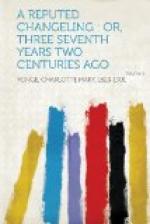“Storms may rush in, and crimes and woes
Deform that peaceful bower;
They may not mar the deep repose
Of that immortal flower.
Though only broken hearts be found
To watch his cradle by,
No blight is on his slumbers sound,
No touch of harmful eye.”
KEBLE.
The news was even worse and worse in that palace of despondency and terror. Notice had arrived that Lord Dartmouth was withheld from despatching the young Prince to France by his own scruples and those of the navy; and orders were sent for the child’s return. Then came a terrible alarm. The escort sent to meet him were reported to have been attacked by the rabble on entering London and dispersed, so that each man had to shift for himself.
There was a quarter of an hour which seemed many hours of fearful suspense, while King and Queen both knelt at their altar, praying in agony for the child whom they pictured to themselves in the hands of the infuriated mob, too much persuaded of his being an imposture to pity his unconscious innocence. No one who saw the blanched cheeks and agonised face of Mary Beatrice, or James’s stern, mute misery, could have believed for a moment in the cruel delusion that he was no child of theirs.
The Roman Catholic women were with them. To enter the oratory would in those circumstances have been a surrender of principle, but none the less did Anne pray with fervent passion in her chamber for pity for the child, and comfort for his parents. At last there was a stir, and hurrying out to the great stair, Anne saw a man in plain clothes replying in an Irish accent to the King, who was supporting the Queen with his arm. Happily the escort had missed the Prince of Wales. They had been obliged to turn back to London without meeting him, and from that danger he had been saved.
A burst of tears and a cry of fervent thanksgiving relieved the Queen’s heart, and James gave eager thanks instead of the reprimand the colonel had expected for his blundering.
A little later, another messenger brought word that Lord and Lady Powys had halted at Guildford with their charge. A French gentleman, Monsieur de St. Victor, was understood to have undertaken to bring him to London—understood—for everything was whispered rather than told among the panic-stricken women. No one who knew the expectation could go to bed that night except that the King and Queen had—in order to disarm suspicion—to go through the accustomed ceremonies of the coucher. The ladies sat or lay on their beds intently listening, as hour after hour chimed from the clocks.
At last, at about three in the morning, the challenge of the sentinels was heard from point to point. Every one started up, and hurried almost pell-mell towards the postern door. The King and Queen were both descending a stair leading from the King’s dressing-room, and as the door was cautiously opened, it admitted a figure in a fur cloak, which he unfolded, and displayed the sleeping face of the infant well wrapped from the December cold.




